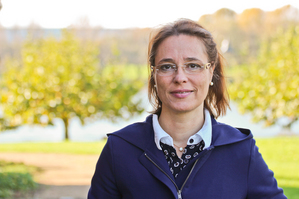Prof. Dr. Eva Schürmann
Otto-von-Guericke-Universität Magdeburg
Curriculum Vitae
Eva Schürmann studied Philosophy, Art History and Modern German Philology as well as Comparative Literature and Theater, Film and Television Studies at the University of Bochum, where she obtained her Magister degree with a thesis on Spinozas Ethik in 1994. In 1998, she completed her doctoral thesis at the University Witten Herdecke, which was published by Fink Verlag in 2000 under the title “Erscheinen und Wahrnehmen” (“To Appear and Perceive”). From 2001 to 2009, she was Researcher at the Institute for Philosophy of the Technical University of Darmstadt. Following a Guest Professorship at the University of Chicago, she completed her habilitation in 2007 with a thesis on the practice of visual perception. In 2009, she became Professor for Cultural Philosophy and Aesthetics at the HAW Hamburg. In 2011, she moved to the University of Magdeburg, where she holds the Chair for Philosophical Anthropology and Philosophy of Culture and Technology. Since January 2014, she is Managing Director of the University of Magdeburg’s Institute for Philosophy. In March 2014, she was awarded the Science Prize of the Aby-Warburg-Stiftung. From October 2014 to September 2015, Professor Schürmann was Fellow at the Käte Hamburger Center for Advanced Study in the Humanities "Law as Culture".
Research Project
The Law and its Mediation (Das Recht und seine Darstellung)
Cultural practice lives in a constant state of tension between facticity and interpretation. Controversial claims to validity clash in competing interpretations and their representations. Disputes over interpretations are battles for the correct construal of reality. Here, it can probably not be emphasized enough that interpretations are generally no matters of private exchange, but are made possible and limited through a socially shared practice that is subject to multi-layered conditions of cultural convictions, technical possibilities and media embodiments.
The fact that issues of justice and injustice also depend on interpretative processes and representations has been discussed and studied as interpretivism and narrativity of law. The project of conducting a representation theoretical investigation of jurisprudence and legal practice intends to analyze the interpretative schemes that can be ascertained in representations. The analytical focus of critical representation theory does not just insist on the individual figures, but generally takes into account the operation of figuration. It investigates the nature of representations as something created as well as the conceptions that precede or are formulated in representations. Further, it asks who represents what when, how and for what purpose.
Publications (selected)
- Sehen als Praxis. Ethisch-ästhetische Studien zum Verhältnis von Sicht und Einsicht, Frankfurt/M.: Suhrkamp 2008. (habilitation treatise)
- Philosophie im Spiegel der Literatur (Ed. along with Gerhard Gamm and Alfred Nordmann), Hamburg: Meiner 2007.
- Das unendliche Kunstwerk (Ed. along with Gerhard Gamm), Berlin: Philo Fine Arts 2007.
- Von Platon bis Derrida. 20 Hauptwerke der Philosophie (Ed. along with Gerhard Gramm), Darmstadt: Primus 2005.
- Spinoza im Deutschland des achtzehnten Jahrhunderts (Ed. along with Norbert Waszek and Frank Weinreich), Stuttgart: frommann-holzboog 2002.
- Verkörpertes Denken – Medialität des Geistes. Skizze einer darstellungstheoretischen Medienanthropologie, in: Engell, Lorenz and Voss, Christiane (Ed.): Körper des Denkens. Neue Positionen der Medienphilosophie, Paderborn: Fink 2013. 69-82.


